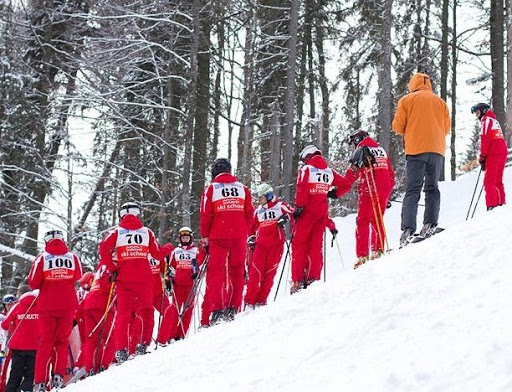“Even a bad day outdoors is better than a good day indoors”. This is a popular feeling amongst many nature enthusiasts and people who enjoy spending time outdoors, despite the conditions they may find themselves in. Whether it’s sat freezing in a boat with the fish not biting or spending a long tiring day in the rain within the trees, some people simply prefer an occupation that allows them to escape four walls and a ceiling.
Being outdoors isn’t just good for your mental state, it can have all sorts of benefits; including boosting physical health. Increases in vitamin D, the rush of endorphins and the stimulated healing of injuries are just a few of the physiological changes that can occur as a result of spending more time outdoors.
It may come as no surprise then as to why so many people choose to work outdoors. Whilst the most lucrative careers require people to be based indoors, there are a growing number of very well-paid and exciting careers for those of us who choose to be outside. Here, we take a look at five outdoor career and how to get those jobs.
1. Geoscientists
- About the job – Geoscientists are involved in the discovery and development of commercially viable and exploitable reserves of natural resources; including water, gas, oils and minerals. As long as our economy relies on extracting materials from the Earth, there will be a demand for people knowing where to dig. They are responsible for studying the planet’s surface and interior to learn about its features and recommend where to find these natural resources. Career options include working with extraction companies as well as public and private organizations that study the Earth for reasons such as measuring geologic events and seismic activity. The amount of time spent outdoors varies, but fieldwork is usually necessary in order to complete assignments, even if it’s in the most remote of places.
- Salary – Starting salaries are in the region of £28-35,000, whereas more senior positions can earn between £40-75,000 per year. Salaries are often dependent on the type of industry you work in, with higher salaries found in the oil and gas sectors for example. Other salary influencers include your employer, location, qualifications, experience and the type of work you’re involved in.
- Requirements – In order to become a geoscientist, a relevant degree within physical, applied and mathematical sciences is required. A postgraduate qualification such as a Masters degree in geoscience or geophysics is also favourable as well as a PhD within a relevant area. In terms of work experience, practical experience from an internship or shadowing is extremely valuable, with many large companies such as BP and Shell offering summer placements for prospective students.

2. Construction & Building Inspectors
- About the job – A great way of avoiding working inside a building is to actually build one. The construction industry is home to plenty of areas that allow people to spend their time outdoors while working on a site instead of in a cubicle. For some private companies and organizations, construction inspectors can visit a variety of locations throughout their day to make sure that they are following the correct specifications and procedures, from domestic building codes to larger structural regulations. Their responsibilities may also include signing-off building projects or focusing on specific areas such as heating and electrical systems.
- Salary – Starting salaries for a building inspector start at around £19,000, with the highest coming in at around £48,000. At the most senior levels, building instructors and surveyors can earn up to £60,000 per year. Individuals within these roles typically have more than ten years’ experience under their belt. Salaries are usually higher for people working in London and the South East, with bonuses being paid on top of your annual wage, though this is likely to be in the private sector only.
- Requirements – To become a building inspector, a degree isn’t essential. However, if you wish to gain professional recognition by becoming chartered or a corporate member of the Chartered Association of Building Engineers (CABE), a number of requirements such as obtaining a relevant degree will need to be met. For those who do not have a relevant degree, postgraduate conversion courses are available that will provide the skills and knowledge needed for further professional qualifications.

3. Marine Biologist
- About the job – If you’re passionate about the environment and want to make a difference to future generations, a career in marine biology may be the job for you. Marine biologists study all aspects of life within the sea and the environment it depends on. Typical responsibilities include investigating marine animals, plants and organisms in deep oceans, shallow seas and the laboratory. The main goal of a marine biologist is to improve the understanding of the entire marine world and to learn and predict changes in ecosystems that are affected by human and natural disturbances. Being a wide-ranging career, there are many areas of work that you could enter, including fieldwork where you would spend most of your time outdoors.
- Salary – Entry-level roles within marine biology can gain salaries that start from £12,000 all the way up to £30,000 depending on the type of work conducted. Experienced workers working in the field are paid in accordance with local salaries (Prospects).
- Requirements – To enter the marine biology industry, a marine-focused degree will need to be obtained, such as marine science, marine biology and oceanography. It is possible, however, to enter the industry with a degree based in other sciences including physics, chemistry and biology. For those who do not have a degree at all, it is also possible to kick start a career outdoors as a marine biologist but only through a seagoing technician and scientific support role.

4. Lawn Care Specialist
- About the job – Working either alone or within a team, lawn care specialists provide all types of different services to private homes, hospitals, governments and corporate buildings. They meet with clients to discuss their lawn maintenance needs, providing professional services that include mowing grass, seeding lawns, applying fertilizer, controlling pests and trimming hedges and trees. They also handle a variety of chemicals which help to prevent weeds from growing, allowing lawns to flourish. They mix and apply fungicides, pesticides, herbicides and insecticides through sprays, vapours, dusts and soil incorporation. Once these treatments have been administered, they often follow-up to see how successful and effective they have been and decide whether further treatment is required. A lawn care specialist’s work tends to be seasonal, with more work in the spring and summer months when most weeds and lawn start to flower.
- Salary – Salaries for a lawn care specialist can vary depending on the position you find yourself in. Whether you’re working alone, are part of a team or have smaller teams working for you will all impact the salary you will earn. Starting salaries for a lawn care specialist can start anywhere from £10,000, with the top earners bringing in up to £30,000+ per year (Indeed).
- Requirements – To become a lawn care specialist, a degree isn’t required. Most learn through on-the-job training, though some education qualifications can help with job prospects. Once employed, in order to progress to senior positions, licenses and certificates that enable the use of pesticides and other treatment resources will need to be obtained. Some lawn care companies may even offer training opportunities where you can learn the necessary skills and knowledge to start your own lawn care business.

5. Surf/Ski/Snowboard Instructor
- About the job – For those who really love the outdoors, becoming a surf, ski or snowboard instructor is a great way to spend a lot of time in natural surroundings, meeting other people and getting paid! Of course, there isn’t much that you don’t already know about becoming an outdoor instructor. Most of your time is spent on the slopes or on the beach, teaching novices and beginners but sometimes more experienced skiers, snowboarders and surfers how to safely and effectively perform specific moves and actions that will help them spend more time on their feet and less time in the snow and sea. When you’re not instructing, you can enjoy the great outdoors and take in the beautiful views of the place you choose to work. These jobs are often seasonal and only require you to work at a few months at a time, but the upsides for outdoor lovers are worth it.
- Salary – When it comes to how much a surf/ski/snowboard instructor earns, there are several variables that can have an influence. Such as the country in which you work, the resort, your experience and qualifications as well as the economic factors affecting the demand for lessons and the strength of a currency. However, despite all of these influencing factors, a study carried out by SnowSkool found that the top-earning ski & snowboard instructors can earn up to £50 per hour, with the lowest figures at £9 per hour. For surf instructors, depending on where you live you can earn up to £23,000 per year (Job Monkey).
- Requirements – To become a surf, ski or snowboard instructor there are a certain set of requirements that need to be met. For example, to be a surf instructor, you will need to be able to surf on a longboard or shortboard, have an adequate level of surfing ability and be certified by an accredited school. To work as a ski or snowboard instructor, you will first need to have a basic level of competency and understanding of the general manoeuvres. You will then need to hold a formal ski or snowboarding instructor qualification. Every country has its own governing body for skiing and snowboarding, some cover both disciplines whereas some have their own accreditors. To work as an instructor, you will need to maintain a professional membership with the relevant association and will be expected to undertake regular refresher and development courses (Base Camp Group).

And there you have it! Five amazing outdoor jobs that will ensure your love for the outside will never fade. There are of course many more occupations that cater to your outdoor preferences, so be sure to take a look around and see which one best suits your needs.
For more great career tips, check out the other blogs on Career Geek.


